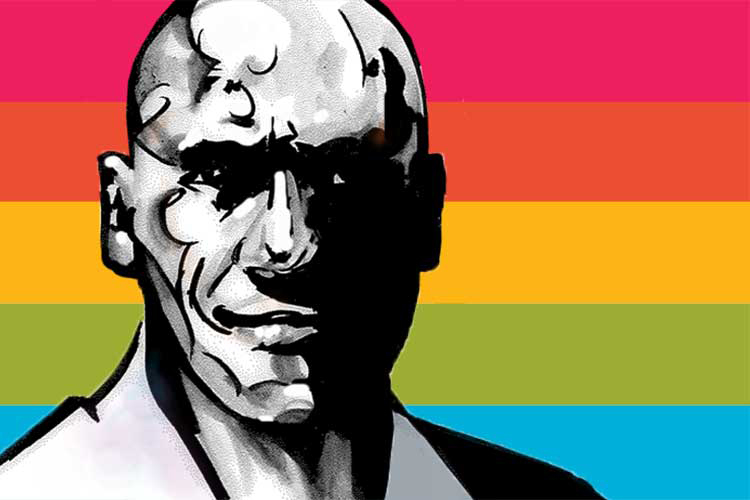Transcript: Fiat Love: Billy Curtis, an S.F. Pride grand marshal, on building inclusivity

June 14, 2018
[Music: “The Zeppelin” by Blue Dot Sessions}
This is Fiat Vox, a podcast that gives you an inside look at why people around the world are talking about UC Berkeley. I’m Anne Brice, a reporter for Berkeley News in the Office of Communications and Public Affairs.
[Music: “Alustrat” by Blue Dot Sessions]
Two decades ago, when Billy Curtis was hired at UC Berkeley, he had his work cut out for him. He was the first fulltime director of LGBTQ resources. It was his job to figure out which policies and procedures should be changed or created on campus to support the LGBTQ community.
Back then, there wasn’t a climate survey that measured how included or excluded people felt on campus, like we have now.
But Curtis says he can speak to what he saw on campus — there was a vibrant gay community, but most people were still pretty much in the dark about what it meant to be trans.
CURTIS: So the climate, I would say, probably was unconsciously hostile to them. It was a day when people didn’t even know they existed, so they were just rolling through.
Curtis is now the director of the Gender Equity Resource Center, known on campus as GenEq, and has spent the past 20 years working to build a more inclusive campus for the LGBTQ community.
This year, he was named a grand marshal of the San Francisco Pride Parade and Celebration. It’s an honor given to people and organizations for their work and advocacy in helping strengthen LGBTQ communities in the Bay Area.
CURTIS: I see this as an opportunity for us as a university to highlight our past, present and continued support of the LGBTQ community. We’re getting honored, but let’s recommit to serving the LGBTQ+ community and any emerging un-yet-named marginalized sexualities and genders.
[Music: “Noe Noe” by Blue Dot Sessions]
Curtis was born in the Bahamas in 1965. By the time he was 13, he started coming out at gay.
CURTIS: It was 1978 when I came out. I spent my entire seventh through 12th grade evolving as a gay man. It was really really hard.
In 1978, being gay in the Bahamas was illegal. Same-sex relationships between consenting adults became legal in the country in 1991.
CURTIS: The threat of violence always hung over your head, if not violence itself. So it was really really hard. It was really scary.
Some of his family wasn’t supportive, so he was careful about who he told. But he was able to get a glimpse of what life could be like when he’d visit his older siblings in college in the U.S.
CURTIS: So I got to see liberation — at least what it looked like then.
At 18, he moved to the U.S. to go to college in Massachusetts, then got his master’s in higher education administration at the University of San Francisco. He’s lived in San Francisco ever since.
CURTIS: We’re not born into families, right? And so we have to go find our people. We have to find our communities.
That’s the philosophy he brings to the campus — that we all need our own communities, places where we feel at home and accepted for who we are at any given moment. Because our identities are fluid, he says, having a place where we can express our whole selves is really important.
[Music: “Discovery Harbor” by Blue Dot Sessions]
Before we get into the projects that Curtis has spearheaded at Berkeley, he wants to be clear that he isn’t the only person implementing policies on campus — it takes a network of committed people to make meaningful and long-lasting changes.
CURTIS: Now I’m careful that I either help move things or move things myself. And it’s hard to pull all of that apart. I don’t do anything by myself.
That said, since he got here, a lot has changed. Especially for the trans community.
As the director of GenEq, Curtis has helped implement trans-inclusive health benefits and athletic policies — and he’s been key in creating gender-inclusive bathrooms across campus. Now more than 40 campus buildings have gender-inclusive bathrooms and more are on the way. There’s even a website — restrooms.berkeley.edu — that lists all the locations.
CURTIS: We had to hire an intern two summers in a row who had to walk the campus and go from building to building to double check.
It’s a lot of work, he says, but it’s what it takes to get it right. To actually begin to change the climate of a campus.
[Music: “Told You So” by Ketsa]
On June 24, the Cal Alumni Association is partnering with GenEq to lead Cal alumni, students, faculty, staff and friends in the 48th annual S.F. Pride parade. Everyone from across the LGBTQ spectrum and allies are welcome to join. Learn more on Cal Alumni’s Facebook page.
Billy Curtis will be there, wearing a Cal Pride t-shirt that reads “Fiat Love.” The first 500 registered marchers to arrive at the meetup will get a free shirt, too.
For Berkeley News, I’m Anne Brice.
You can subscribe to the Fiat Vox podcast on Apple Podcasts or Stitcher or wherever you get your podcasts. For more UC Berkeley news, visit news.berkeley.edu. If you have a great story idea, send us an email at [email protected].